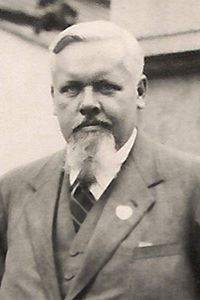Oskar Anderson facts for kids
Quick facts for kids
Oskar Anderson
|
|
|---|---|

Oskar Anderson in Tartu (around 1930)
|
|
| Born |
Oskar Johann Viktor Anderson
2 August [O.S. 21 July] 1887 Minsk, Minsk Governorate, Russian Empire
|
| Died | February 12, 1960 (aged 72) |
| Nationality | German, Bulgarian, Russian |
| Alma mater |
|
| Known for | Variate Difference Method |
| Spouse(s) | Margarethe Natalie von Hindenburg-Hirtenberg |
| Scientific career | |
| Fields |
|
| Institutions |
|
| Thesis | (1912) |
| Academic advisors | Alexander Alexandrovich Chuprov |
Oskar Johann Viktor Anderson (born August 2, 1887 – died February 12, 1960) was a smart mathematician from a German family living in the Baltic region. He was born in the Russian Empire. He is famous for his work in mathematical statistics and econometrics. These are special kinds of math used to understand numbers and money.
Contents
Life
Early Life and Family
Oskar Anderson was born in Minsk, which is now in Belarus. His family was German, but they lived in the Russian Empire. Soon after he was born, his family moved to Kazan, Russia.
Oskar's father, Nikolai Anderson, was a professor. He taught about languages like Finnish and Hungarian at the University of Kazan. Oskar also had two older brothers who became well-known. One was Walter Anderson, who studied old stories and traditions. The other was Wilhelm Anderson, who studied stars and space.
Education and Early Career
Oskar was a very good student. He finished high school in Kazan in 1906 with a special gold medal. He first studied mathematics at the University of Kazan for a year. Then, he moved to St. Petersburg to study economics at the Polytechnic Institute.
From 1907 to 1915, Oskar learned a lot from his teacher, Alexander Alexandrovich Chuprov. Chuprov was also his helper. In 1912, Oskar married Margarethe Natalie von Hindenburg-Hirtenberg. He also started teaching at a business school in St. Petersburg. At the same time, he studied law at the University of Saint Petersburg. He finished his law degree in 1914.
Moving Around the World
In 1918, Oskar became a professor in Kiev. But he had to leave Russia in 1920 because of the Russian Revolution. This was a big change in Russia. He first went to Budapest in Hungary. Later, in 1924, he became a professor at the University of Economics in Varna, Bulgaria.
Important Work and Recognition
Oskar Anderson was one of the first people to join the Econometric Society. This is a group for people who study economics using math. In 1933, the members chose him as a special member. In the same year, he also got help from the Rockefeller Foundation. This foundation gives money to support important research.
With this support, Oskar started a special place in 1935. It was called the Statistical Institute for Economic Research. It was at the University of Sofia. He became its director. For many years, he also worked with the League of Nations. This was an organization that tried to keep peace in the world. He helped them with their numbers and statistics.
Later Career and Retirement
In 1942, Oskar joined the Kiel Institute for the World Economy. He led the department that studied Eastern countries. He also became a full professor of statistics at the University of Kiel. His brother Walter joined him there after World War II ended.
In 1947, Oskar moved to the University of Munich. He taught there until 1956, when he decided to retire.
Images for kids
 | Bessie Coleman |
 | Spann Watson |
 | Jill E. Brown |
 | Sherman W. White |


